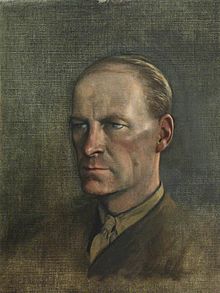Gilbert Ryle
Jump to navigation
Jump to search

Gilbert Ryle (19 August 1900 in Brighton – 6 October 1976 in Oxford) was a British philosopher. He was a representative of the generation of British ordinary language philosophers who shared Wittgenstein's approach to philosophical problems, and is principally known for his critique of Cartesian dualism, for which he coined the phrase "the ghost in the machine."
Quotes[edit]
The Concept of Mind (1949)[edit]
- A myth is, of course, not a fairy story. It is the presentation of facts belonging to one category in the idioms appropriate to another. To explode a myth is accordingly not to deny the facts but to re-allocate them.
- Introduction
- There is a doctrine about the nature and place of the mind which is prevalent among theorists, to which most philosophers, psychologists and religious teachers subscribe with minor reservations. Although they admit certain theoretical difficulties in it, they tend to assume that these can be overcome without serious modifications being made to the architecture of the theory.... The official doctrine, which hails chiefly from Descartes, is something like this. With the doubtful exceptions of idiots and infants in arms every human being has both a body and a mind. Some would prefer to say that every human being is both a body and a mind. His body and his mind are ordinarily harnessed together, but after the death of the body his mind may continue to exist and function.
- Ch. I: Descartes' Myth, (1) The Official Doctrine
- The mind is its own place and in his inner life each of us lives the life of a ghostly Robinson Crusoe. People can see, hear and jolt one another’s bodies, but they are irremediably blind and deaf to the workings of one another’s minds and inoperative upon them.
- Ch. I: Descartes' Myth, (1) The Official Doctrine
- Such in outline is the official theory. I shall often speak of it, with deliberate abusiveness, as "the dogma of the Ghost in the Machine." I hope to prove that it is entirely false, and false not in detail but in principle. It is not merely an assemblage of particular mistakes. It is one big mistake and a mistake of a special kind. It is, namely, a category mistake. It represents the facts of mental life as if they belonged to one logical type or category (or range of types or categories), when they actually belong to another. The dogma is therefore a philosopher’s myth.
- Ch. I: Descartes' Myth, (2) The Absurdity of the Official Doctrine
- Myths often do a lot of theoretical good, while they are still new.
- Ch. I: Descartes' Myth, (4) Historical Note
- It is of first-rate importance to notice from the start that stupidity is not the same thing, or the same sort of thing, as ignorance. There is no incompatibility between being well-informed and being silly, and a person who has a good nose for arguments or jokes may have a bad head for facts.
- Ch. II: Knowing How and Knowing That, (2) Intelligence and Intellect
- Contemporary philosophers have exercised themselves with the problem of our knowledge of other minds. Enmeshed in the dogma of the ghost in the machine, they have found it impossible to discover any logically satisfactory evidence warranting one person in believing that there exist minds other than his own. I can witness what your body does, but I cannot witness what your mind does, and my pretensions to infer from what your body does to what your mind does all collapse, since the premises for such inferences are either inadequate or unknowable.
- Ch. II: Knowing How and Knowing That, (10) Solipsism
- To see is one thing; to picture or visualise is another. A person can see things, only when his eyes are open, and when his surroundings are illuminated; but he can have pictures in his mind’s eye, when his eyes are shut and when the world is dark.
- Ch. VIII: Imagination, (2) Picturing and Seeing
Quotes about Gilbert Ryle[edit]
- The term philosophy of mind came into currency in the English-speaking world in the 1950's, largely as a description of the debates initiated by Gilbert Ryle's pioneering book The Concept of Mind, published in 1949. Ryle's book was a polemic against the Cartesian idea that mental states are states of an immaterial substance. This polemic, and the ensuing discussion, turned on the question of the reducibility of mental events to behavioral dispositions. Ryle's central argument was that we had misconceived the "logic" of such words as "belief," "sensation," "conscious," etc. He thought that the traditional, Cartesian theory of mind, had "misconstrued the type-distinction between disposition and exercise into its mythical bifurcation of unwitnessable mental causes and their witnessable physical effects" (pg 32). Ryle's attempt to do philosophy of mind as conceptual analysis was founded on the pre-Quinean idea that philosophical puzzles arose out of misunderstandings of the logic of our language.
- Scott M. Christensen, Dale R. Turner (2013), Folk Psychology and the Philosophy of Mind. p. 388
External links[edit]
- The Concept of the Mind online text
